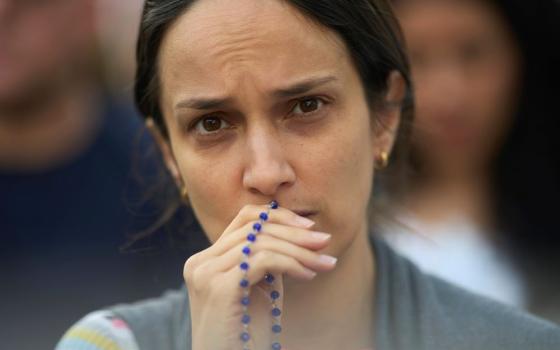Cardinal Marc Ouellet went to Lough Derg the other night, a traditional site for pilgrimages of penance in Ireland with associations going back to the days of St. Patrick and, this being Ireland, where the natural and the supernatural intertwine, perhaps even before the time of St. Patrick. He met with the victims of clergy sex abuse, as Pope Benedict has done on several occasions.
The Cardinal-Prefect of the Congregation for Bishops is serving as Pope Benedict’s Legate to the International Eucharistic Congress in Dublin. He was appropriately blunt about why he had gone to Lough Derg for a night of prayer and penance:
In the name of the Church, I apologize once again to the victims, some of whom I have met here in Lough Derg.
It is difficult to assess the damage that is done to the victims of clergy sex abuse, and it is even more difficult to assess the damage the cover-up of such abuse has done to the Church. We are learning that adjectives like “inadequate” and “inefficient” are themselves inadequate and inefficient, that adjectives like “criminal” are going to be applied to both the crimes and the cover-ups by a culture that demands accountability. Am I the only one who is still shocked to see Bishop Fabian Bruskewitz, who has refused to comply with the mandated audit of child protection in his diocese for ten years now, still taking the microphone at USCCB meetings, still sitting on his cathedra in Lincoln? Cardinal Ouellet needs to put some decisions behind his words, decisions to hold bishops accountable as well as clergy.
That said, I was struck by both Ouellet’s words and his gestures. He spoke of conversion as something to which we are all called, all the time, to eradicate sin in our lives and in our midst by clinging to God and seeking to be surrounded by Him. Ouellet ended his brief remarks with the beautiful, and beautifully simple, prayer of St. Patrick:
Christ behind me, Christ before me,
Christ beside me, Christ to win me,
Christ to comfort and restore me.
Most of all, what stood out to me was the haunting picture of Ouellet walking in a simple black cassock amidst the rocks of Lough Derg. The island looks very bleak, the vegetation sparse, the rocks abundant, the walls of the retreat center almost fortress-like as befits a place where spiritual battle is undertaken: It is known as Patrick’s Purgatory for good reason. The cardinal had just met, or was about to meet, the victims of clergy sex abuse, people whose lives had been broken, in some cases beyond repair. We moderns like to fix things, to find solutions, and I am all for that, but there are tragedies and crimes and sadnesses in human life that can’t be “fixed,” at least not by us, and for which the only remedy is prayer and penance.
The prophets called their people to conversion, a fact that is sometimes forgotten. The first line of most biblical prophecy is always some variation on the words, “Return, O Israel.” I am up in Connecticut now and do not have at hand Cardinal Francis George’s theology dissertation, but if I can paraphrase, he wrote something to the effect that, “The prophets never called the people to cease to be Israelites.” When I read Christine Firer Hinze’s article about the LCWR in America, she talked at some length about prophetic lives, but she seemed to pair that prophetic vision with experimentation and pushing the envelope, not with “Return, O Israel.” I admit have grown suspicious of people who invoke the gift of prophecy to justify experimentation and pushing the envelope, especially when having pushed the envelope, people invoking their prophetic call end up with the attitudes and values we associate with the editorial pages of the New York Times.
No one can see into another person’s heart. I do not know what is in Professor Hinze’s heart nor, for that matter, in Cardinal Ouellet’s. Sometimes, it is difficult to discern what is in my own heart. But, I do know this: Sometimes, you have to go to the rough places like Patrick’s Purgatory, where the rockiness and isolation of the landscape mirrors the rockiness and isolation of our lives. Now is always the best time to be conscious of our sinfulness, the first and necessary step towards conversion. With Peguy, I believe the most powerful words in the language are, “A man had two sons….” Those words remind us of the super-abundant mercy of God and, just so, the solidness of our grounds for hope, real hope, not for a better tomorrow which is an easy thing to hope for, but hope for an eternity of divine love. But, of course, the Prodigal turned around. Maybe he discovered Lough Derg in his travels.



